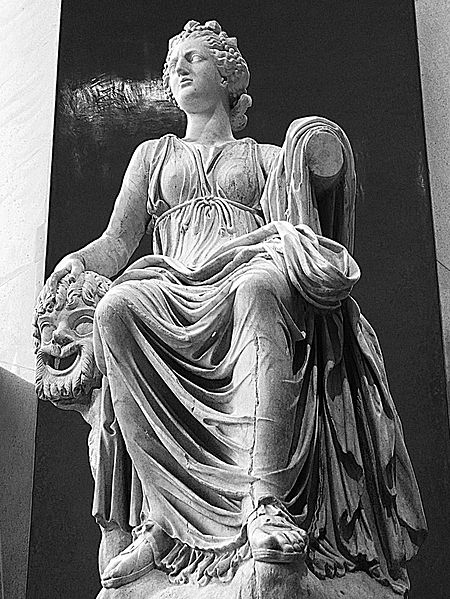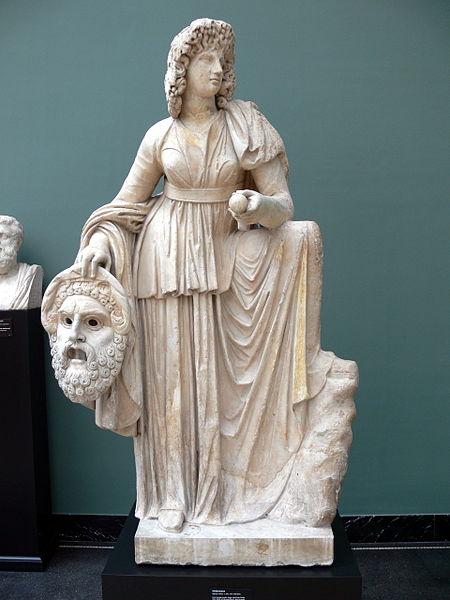Drama Club
Drama is the specific mode of fiction represented in performance. The term comes from a Greek word meaning "action" (Classical Greek: δρᾶμα, drama), which is derived from the verb meaning "to do" or "to act" (Classical Greek: δράω, draō).
The two masks associated with drama represent the traditional generic division between comedy and tragedy. They are symbols of the ancient Greek Muses, Thalia and Melpomene. Thalia was the Muse of comedy (the laughing face), while Melpomene was the Muse of tragedy (the weeping face).
Thalia /θəˈlaɪə/ (Ancient Greek: Θάλεια, Θαλία; "the joyous, the flourishing", from Ancient Greek: θάλλειν, thállein; "to flourish, to be verdant") was the Muse who presided over comedy and idyllic poetry. In this context her name means "flourishing", because the praises in her songs flourish through time. She was the daughter of Zeus and Mnemosyne, the eighth-born of the nine Muses.
|
Melpomene (/mɛlˈpɒmɨniː/; Greek: Μελπομένη; "to sing" or "the one that is melodious"), initially the Muse of Singing, she then became the Muse of Tragedy, for which she is best known now. Her name was derived from the Greek verb melpô or melpomai meaning "to celebrate with dance and song." She is often represented with a tragic mask and wearing the cothurnus, boots traditionally worn by tragic actors. Often, she also holds a knife or club in one hand and the tragic mask in the other.
|
Classical Greek drama
Western drama originates in classical Greece. The theatrical culture of the city-state of Athens produced three genres of drama: tragedy, comedy, and the satyr play. Their origins remain obscure, though by the 5th century BCE they were institutionalised in competitions held as part of festivities celebrating the god Dionysus.
Historians know the names of many ancient Greek dramatists, not least Thespis, who is credited with the innovation of an actor ("hypokrites") who speaks (rather than sings) and impersonates a character (rather than speaking in his own person), while interacting with the chorus and its leader ("coryphaeus"), who were a traditional part of the performance of non-dramatic poetry (dithyrambic, lyric and epic).
Only a small fraction of the work of five dramatists, however, has survived to this day: we have a small number of complete texts by the tragedians Aeschylus, Sophocles and Euripides, and the comic writers Aristophanes and, from the late 4th century, Menander.
Aeschylus' historical tragedy The Persians is the oldest surviving drama, although when it won first prize at the City Dionysia competition in 472 BCE, he had been writing plays for more than 25 years. The competition ("agon") for tragedies may have begun as early as 534 BCE; official records ("didaskaliai") begin from 501 BCE, when the satyr play was introduced. Tragic dramatists were required to present a tetralogy of plays (though the individual works were not necessarily connected by story or theme), which usually consisted of three tragedies and one satyr play (though exceptions were made, as with Euripides' Alcestis in 438 BCE). Comedy was officially recognised with a prize in the competition from 487 to 486 BCE.
Five comic dramatists competed at the City Dionysia (though during the Peloponnesian War this may have been reduced to three), each offering a single comedy. Ancient Greek comedy is traditionally divided between "old comedy" (5th century BCE), "middle comedy" (4th century BCE) and "new comedy" (late 4th century to 2nd BCE.)
Classical Roman drama
Following the expansion of the Roman Republic (509-27 BCE) into several Greek territories between 270-240 BCE, Rome encountered Greek drama. From the later years of the republic and by means of the Roman Empire (27 BCE-476 CE), theatre spread west across Europe, around the Mediterranean and reached England; Roman theatre was more varied, extensive and sophisticated than that of any culture before it.


Connect With Us